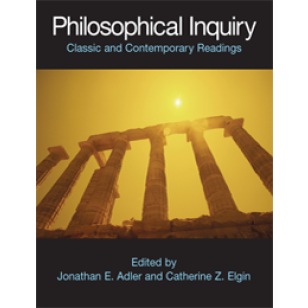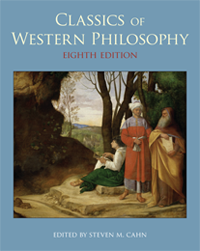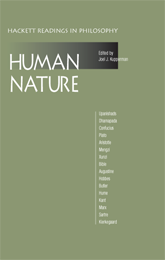Philosophical Inquiry
This meticulously edited anthology provides a comprehensive, problems-oriented entrée to philosophy. Substantial readings from major classical and contemporary thinkers—featuring many of Hackett's widely acclaimed translations—are supported by a general introduction, engaging introductions to each major topic, and a glossary of important philosophical terms. (North American rights only)
To view study questions about the readings, URLs to web sites on studying philosophy, a Table of Contents with links to additional relevant material, and multiple choice quizzes about the readings, please visit the Philosophical Inquiry title support page by clicking here.
This meticulously edited anthology provides a comprehensive, problems-oriented entrée to philosophy. Substantial readings from major classical and contemporary thinkers—featuring many of Hackett's widely acclaimed translations—are supported by a general introduction, engaging introductions to each major topic, and a glossary of important philosophical terms. North American rights only.
Reviews:
"Broad and comprehensive, it is hard to imagine a better value. The organization of readings is straightforward and yet flexible."
—Paul Babbitt, Department of History and Political Science, Southern Arkansas University
"Terrific! Has all the necessary papers for a successful introductory course. And the price is a minor miracle!"
—Harvey Siegel, Department of Philosophy, University of Miami
Table of Contents:
(Selections are complete except where noted.)
Why Study Philosophy?
I. KNOWLEDGE
Introduction
A. The Nature of Knowledge
- Plato. Meno [tr. Grube].
- Plato. Republic ('Myth of Cave' Book VII (selections)) [tr. Grube, rev. Reeve].
- Kant, Immanuel. Critique Pure of Reason, [tr. W.S. Pluhar] (selections).
- Russell, Bertrand. The Problems of Philosophy ('How A Priori Knowledge is Possible').
- Kripke, Saul. 'The A Priori and the Necessary' (selections).
- Gettier, Edmund. 'Is Justified True Belief Knowledge?'
- Nozick, Robert. Philosophical Explanations (selections).
B. Skepticism and the Scope of Knowledge
- Descartes, Rene. Meditations on First Philosophy [tr. Cress].
- Chisholm, Roderick. The Foundations of Knowing ('The Problem of the Criterion').
- Peirce, C. S. 'How to Make our Ideas Clear'.
- Stroud, Barry. 'Philosophical Scepticism and Everyday Life' (selections).
- Nozick, Robert. 'Skepticism.'
C. Perceptual and Inductive Knowledge
- Locke, John. An Essay Concerning Human Understanding (selections).
- Berkeley, George. Three Dialogues between Hylas and Philonous (selections).
- Goldman, Alvin. 'Discrimination and Perceptual Knowledge'.
- Hume, David. An Enquiry Concerning Human Understanding, (selections)
- Reid, Thomas. Essays on the Intellectual Powers of Man ('Reflections on the Common Theory of Ideas').
- Russell, Bertrand. The Problems of Philosophy ('On Induction').
- Goodman, Nelson. 'The New Riddle of Induction'.
II. METAPHYSICS
Introduction
A. Causation and The Nature of Reality
- Parfit, Derek. 'Why Anything? Why This?'
- Leibniz, Gottfried. Monadology [tr. Ariew/Garber].
- Aristotle. Physics (Book I-II (selections)) [tr. Irwin/Fine].
- Lewis, David. 'Causation' (selections)
- Salmon, Wesley. 'Why Ask "Why"?'
- Dennett, Daniel. Darwin's Dangerous Idea (selection).
B. Identity and Personal Identity
- Thomson, Judith Jarvis. 'The Statue and the Clay'.
- Locke, John. An Essay Concerning Human Understanding (selections).
- Reid, Thomas. 'Of Identity,' (selections).
- Perry, John. A Dialogue on Personal Identity and Immortality (selections).
- Parfit, Derek. 'Personal Identity'.
C. Freedom of the Will
- van Inwagen, Peter. 'The Incompatibility of Free Will and Determinism'.
- Chisholm, Roderick. 'Human Freedom and the Self'.
- Frankfurt, Harry. 'Freedom of the Will and the Concept of a Person'.
- Lewis, David. 'Are We Free to Break the Laws?'
- Nagel, Thomas. 'Moral Luck'.
III. PHILOSOPHY OF MIND
Introduction
- Smart, J.J.C. 'Sensations and Brain Processes'.
- Putnam, Hilary. Art, Mind, and Religion ('The Nature of Mental States').
- Dennett, Daniel. The Intentional Stance ('The Intentional Stance and Why It Works').
- Fodor, Jerry. 'Three Cheers for Propositional Attitudes'.
- Nagel, Thomas. 'What is it Like to be a Bat?'
- Jackson, Frank. 'Epiphenomenal Qualia'.
- Putnam, Hilary. 'Brains in a Vat'.
IV. ETHICS
Introduction
A. Major Theories
- Plato. Euthyphro [tr. Grube].
- Aristotle. Nicomachean Ethics (selections) [tr. Irwin/Fine].
- Kant, Immanuel. Grounding for the Metaphysic of Morals (selections) [tr. Ellington].
- Mill, J. S. Utilitarianism (Ch. II (selections); Ch. IV).
- Nietzsche, Fredrich. On the Genealogy of Morality (selections) [tr. Clark/Swensen].
B. Motivation, Self-Interest and the Good Life
- Plato. Apology [tr. Grube].
- Darwall, Stephen. Philosophical Ethics (Ch.10-11 'Hobbes').
- Camus, Albert. The Myth of Sisyphus and Other Essays ('The Myth of Sysiphus' (selections)).
- Nozick, Robert. Anarchy, State, and Utopia ('The Experience Machine').
C. Metaethics
- Hume, David. Treatise on Human Nature (selections).
- Mackie, John. Ethics ('The Subjectivity of Values' (selections)).
- Rawls, John. 'Two Concepts of Rules' (selections).
- Korsgaard, Christine. 'What's Wrong with Lying?' (new essay).
D. Applications
- Foot, Phillipa. 'The Problem of Abortion and the Doctrine of Double Effect'.
- Thomson, Judith Jarvis. 'A Defense of Abortion'.
- Singer, Peter. 'Famine, Affluence, and Morality'.
- Rachels, James. 'Active and Passive Euthanasia'.
- Nagel, Thomas. 'War and Massacre,' (complete)
- Bennett, Jonathan. 'The Conscience of Huckleberry Finn'.
V. POLITICAL PHILOSOPHY
Introduction
- Hobbes, Thomas. Leviathan (selections).
- Locke, John. Second Treatise of Government (selections).
- Mill, J. S. On Liberty (Ch.1 (complete)).
- Marx, Karl. 'Economic and Philosophic Manuscripts of 1844.' (selections).
- Rawls, John. A Theory of Justice (selections).
- Nozick, Robert. Anarchy, State and Utopia ('Social Cooperation', 'Terms of Cooperation and the Difference Principle', 'The Original Position and End Result Principles' (selections)).
VI. PHILOSOPHY OF RELIGION
Introduction
A. The Existence and Nature of God
- Anselm. Proslogion ('The Ontological Argument' (selections)) [tr. Williams].
- Aquinas, Thomas. Summa Theologica ('The Five Ways-Question II, Third Article') [tr. Pegis].
- Rowe, W. L. Man and World ('The Cosmological Argument and the Principle of Sufficient Reason').
- Hume, David. Dialogues Concerning Natural Religion (selections).
- Flew, Anthony. 'Theology and Falsification'.
- Leibniz, Gottfired. Theodicy ('A Refutation of Arguments from Evil', Objections/Answers I-IV).
- Mackie, John. 'Evil and Omnipotence'.
- van Inwagen, Peter. 'The Magnitude, Duration and Distribution of Evil: A Theodicy' (selections).
B. Reason and Faith
- Hume, David. An Enquiry Concerning Human Understanding ('On Miracles' (selections)).
- Price, R. 'On the Importance of Christianity and the Nature of Historical Evidence, and Miracles, Section II The Nature and Grounds of the Regard due to Experience and to the Evidence of Testimony, Stated and Compared'.
- Pascal, Blaise. Pensees ('The Wager,' (complete)) [tr. Ariew].
- Clifford, W.K. 'The Ethics of Belief,' (selections).
- James, William. 'The Will to Believe'.
- Williams, B.A.O. Problems of the Self ('Deciding to Believe').
VII. AESTHETICS
Introduction
- Hume, David. 'Of the Standard of Taste'.
- Kant, Immanuel. Critique of Judgment (selections).
- Tolstoy, Leo. 'What Is Art?' (selections).
- Goodman, Nelson. Ways of Worldmaking ('When Is Art?').
- Danto, Arthur. 'The Artistic Enfranchisement of Real Objects: The Artworld'.
- Dickie, George. Art and the Aesthetic: An Institutional Analysis ('What Is Art? An Institutional Analysis').
Glossary
Biographical Notes.
About the Authors:
Jonathan E. Adler (1948-2012) was Professor of Philosophy, City University of New York.
Catherine Z. Elgin is Professor of the Philosophy of Education, Harvard University.






